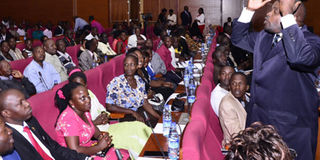Find lasting solution to public universities’ pay concerns

cademic and non-teaching staff in public universities across the country downed their tools yesterday to protest failure by the government to fulfil a promise dating back to 2015.
Then, President Museveni declared that all workers pay in public universities would be enhanced. The enhancement, which was meant to be implemented over a five-year period between 2015 and 2020, would have seen a university professor bag at least Shs15 million per month.
It is unfortunate that the lecturers have resorted to industrial action in order to elicit a positive response from the government. However, perhaps even worse is the fact that this is not the first time that they have resorted to such a course of action and it is increasingly looking like it will not be the last time that we are witnessing such a development.
This is because government seems to be incapable of coming up with a lasting solution to this problem.
Poor diagnosis and wrong prescriptions to problems seems to have become the norm and practice.
In November 2016 when the academic staff at Makerere University went on strike demanding for nine months accrued arrears, which sucked in students who also went on strike demanding that lecturers resume teaching as they pursued their demands, Mr Museveni invoked his powers under the Constitution and Section 26(2) of the Universities and Other Tertiary Institutions Act 2001 as amended and closed down the university. He cited concerns over the safety of persons and property.
Employees of the university were also given a few days to return all the university’s vehicles in their use, which was an attempt to arm-twist them into returning to work without first getting their pay.
In 2017, at the height of industrial action by members of Uganda Medical Association, who were calling for improved pay and working conditions, some people in government came up with the fantastic idea of importing 200 doctors from Cuba and the possibility of hiring retired medical workers to fill the manpower gaps.
This time round, government should not resort to such short-termism. Closure of the institutions, arm-twisting the striking workers or threatening to hire foreigners should not be a part of the thinking.
Those will neither solve the problem nor help the country to develop the kind of manpower that it requires in order to become the middle income country that it aspires to be.
The starting point could be by showing the striking workers some money.




